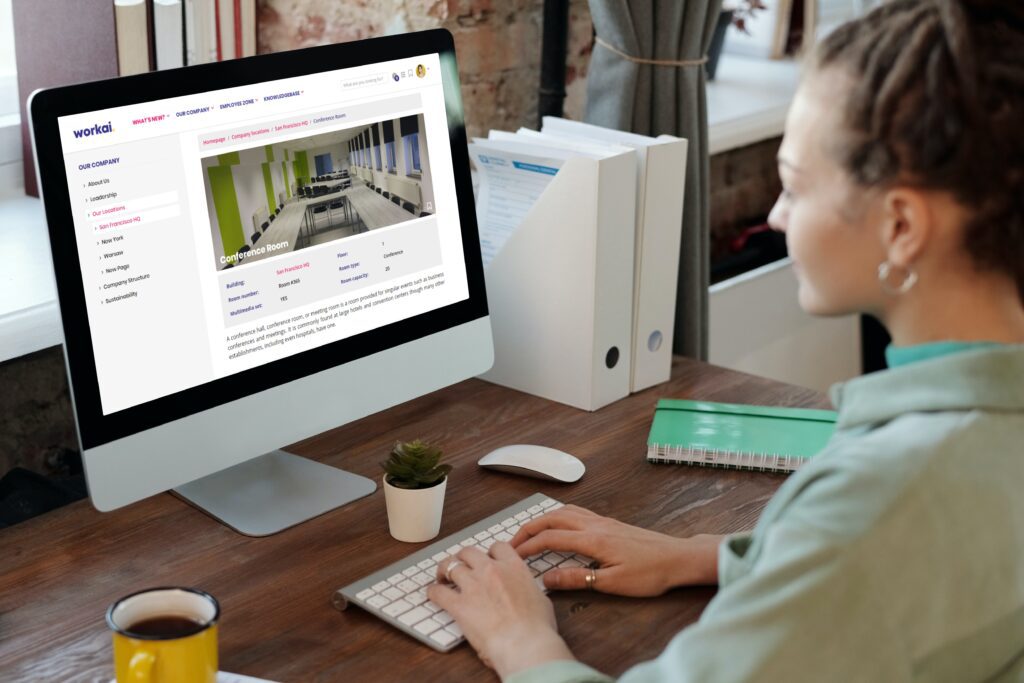
Digital workplace tools – from adoption to success
In the ever-evolving landscape of the digital workplace, a remarkable transformation has taken place. What was once a realm solely dedicated to equipping employees with tools has now blossomed into a holistic Employee Experience (EXP). This paradigm shift signifies more than just a change in technology – it embodies a fundamental reimagining of the employee’s role. They are no longer seen merely as workers, employees are now recognized as vital contributors whose well-being and experiences are paramount to the overall success and vitality of the company.

Digital workplace tools
In the digital age, the adoption of digital workplace tools brings both innovation and challenges, notably information chaos. To address this, organizations must develop a comprehensive understanding of their digital workplace for an effective Digital Employee Experience (DEX) strategy. Josh Bershin identifies key tools like productivity management and those shaping the employee journey. Advanced ERP/CRM/CDP systems are vital, and a second category includes orchestrators and Employee Experience (EX) platforms. Among these, EX platforms play a pivotal role in fostering a positive work environment. Understanding and strategically leveraging EX platforms are crucial for ensuring a seamless digital employee experience amid the dynamic digital landscape.
Implementing digital workplace
Optimizing the digital workplace rests on three pillars: adoption, training, and alignment with business goals. Firstly, meeting employee expectations for a consumer-grade experience emphasizes seamless tool adoption. Secondly, comprehensive training is crucial to empower employees in navigating and using digital tools effectively. Thirdly, viewing the digital workplace as a means to achieve business goals is essential. Recognizing the intricacies of the employee digital journey and aligning tools with individual roles fosters a simpler and more effective employee experience. The key is understanding the digital workplace as a strategic tool for business success. Embracing complexity behind the scenes is the pathway to delivering a streamlined employee experience, enhancing overall efficiency and productivity.

The digital Workplace can play a critical role in a modern approach to managing people and organizations. Solutions are a factor, but it is the adoption of tools that makes the real difference.
Sam Marshall, Director, ClearBox Consulting
A new generation of workplace tools: EX Platforms
The rise of Employee Experience Platforms (EXPs) marks a new era in workplace tools, revolutionizing how organizations manage their internal applications and systems. In contrast to traditional methods relying on disparate tools, EXPs present a holistic, cloud-based solution infused with the power of artificial intelligence (AI). At the core of EXPs is a personalized interface, simplifying access to all company applications and systems, thereby enhancing convenience and elevating the overall employee experience. Recognizing the pivotal role of EXPs, organizations are embracing these comprehensive platforms as the cornerstone of their digital transformation journey, akin to the role Customer Experience Platforms play in customer-centric strategies. EXPs orchestrate the entire employee journey, ensuring seamless cohesion from onboarding to daily tasks, professional development, and offboarding. With their ability to streamline and manage every touchpoint, EXPs emerge as the essential puzzle piece in the modern Digital Workplace.

The era of hybrid work
In the era of hybrid work, Employee Experience Platforms (EXPs) have emerged as essential allies for organizations navigating the transformative landscape. Tailored to address the challenges and opportunities of hybrid work arrangements, EXPs offer a range of features, processes, and analytics that cater to evolving workforce needs. In promoting inclusivity, EXPs empower employees with the flexibility to schedule work hours, choose between remote and in-office work, and align their work styles with individual preferences. Integrated tools enable employees to plan schedules, book resources, and facilitate hybrid meetings. EXPs serve as the linchpin in crafting a work environment that prioritizes the needs, satisfaction, and productivity of all employees, seamlessly bridging the gap between remote and in-office work. In a world where work is increasingly flexible, EXPs lay the foundation for a brighter future, fostering collaboration and well-being irrespective of location.

AI shaping the future of work
Generative AI tools are experiencing a surge in popularity, transforming content creation across various domains, including employee experiences. Leveraging neural networks and machine learning, these tools autonomously generate human-like text, visuals, and multimedia, revolutionizing traditional approaches. The impact of generative AI extends beyond convenience, reshaping content creation, automating data analysis, and influencing decision-making processes in businesses. This technological advancement not only unlocks new possibilities for creativity and productivity but also prompts ethical considerations regarding AI-generated content. Employee Experience Platforms stand to benefit significantly from current AI trends and technologies. From content creation to data analysis, predictive analytics, natural language processing, and advanced chatbots are set to become standard features, enhancing personalization and responsiveness. Moreover, AI-driven well-being initiatives will prioritize stress reduction and mental health support, contributing to a holistic and adaptive employee experience.

The future of AI in Employee Experience
The future of Artificial Intelligence (AI) in Employee Experience (EXP) heralds the evolution of intelligent, adaptive platforms tailored to anticipate and meet diverse employee needs within the dynamics of a hybrid work environment. As AI continues to progress, organizations face the challenge of maintaining a delicate balance between harnessing AI’s capabilities and upholding ethical considerations. The objective is to ensure the employee experience remains human-centric and empathetic amid technological advancements. AI-driven EXPs are poised to lead this transformative journey, reshaping the landscape of how we work, connect, and thrive in the digital age.
Choosing and implementing an EXP
Choosing and implementing an Employee Experience Platform (EXP) is a pivotal strategic decision with profound implications for an organization’s success. The journey begins with recognizing the need for an EXP, driven by a dual understanding: acknowledging the evolving expectations of employees for a modern, user-centric digital workplace and recognizing the substantial business benefits arising from enhanced employee engagement, productivity, and retention. The implementation process involves crucial steps, including thorough analysis, securing stakeholder buy-in, meticulous platform selection, content audit, strategy creation, proof of concept, and the formulation of a strategic launch plan. Ongoing feedback analysis ensures the continuous refinement and optimization of the Employee Experience Platform to meet the dynamic needs of the workforce and the evolving digital landscape.
